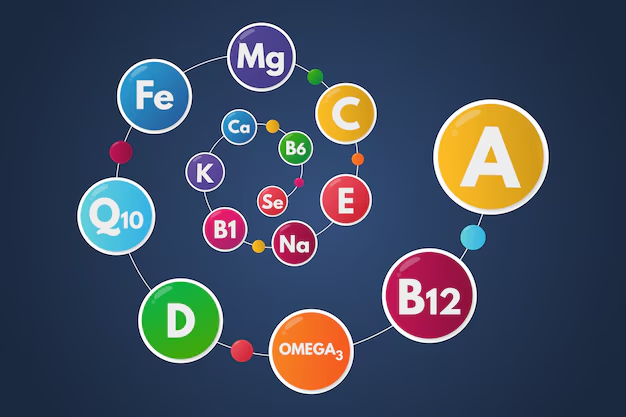Vitamins and minerals are crucial for maintaining overall health, supporting bodily functions, and ensuring optimal well-being. However, due to dietary choices, lifestyle factors, or certain health conditions, many people may unknowingly be deficient in essential nutrients. Deficiencies can manifest in a variety of physical and mental symptoms, often subtle but sometimes more severe. Here are 10 common signs that you might be lacking essential vitamins and minerals.

1. Fatigue and Low Energy Levels:
One of the most common signs of a vitamin or mineral deficiency is persistent fatigue. If you’re constantly feeling tired despite adequate sleep, you might be deficient in iron, vitamin B12, or vitamin D. These nutrients play key roles in energy production, red blood cell formation, and oxygen transport throughout the body. A deficiency in any of these can lead to low energy levels and even anemia.

2. Weak Muscles and Cramps:
Muscle weakness, cramps, or spasms could signal a deficiency in magnesium, potassium, or calcium. These minerals are essential for proper muscle function and nerve signaling. A lack of them can cause muscle tightness or cramps, especially after physical activity. If you experience frequent muscle issues, it might be time to check your levels of these important nutrients.

3. Brittle Hair and Nails:
Thin, brittle, or splitting hair and nails can be a sign of biotin (vitamin B7) deficiency. Biotin is crucial for keratin production, the protein that makes up hair, skin, and nails. Deficiencies in zinc or iron may also contribute to brittle nails, thinning hair, or even hair loss. If you notice changes in your hair or nails, it might be worth examining your vitamin and mineral intake.

4. Frequent Infections or Illness:
If you find yourself frequently getting sick or struggling to recover from common infections, you may be deficient in vitamins C, D, or zinc. These nutrients play a key role in supporting the immune system. Vitamin C boosts immune defense, while vitamin D and zinc help regulate immune responses. Low levels can leave you more susceptible to colds, flu, and infections.

5. Vision Problems:
Poor vision, especially at night, or dry eyes could indicate a deficiency in vitamin A. Vitamin A is essential for eye health and maintaining good vision, particularly in low-light conditions. Severe deficiencies in this vitamin can lead to night blindness or even permanent eye damage if left untreated. Additionally, omega-3 fatty acids are crucial for eye health and preventing dry eyes.

6. Pale or Discolored Skin:
A deficiency in iron or vitamin B12 can lead to anemia, which often manifests as pale or discolored skin. These nutrients are necessary for producing red blood cells, which carry oxygen to your tissues. A lack of them can cause your skin to appear pale, sallow, or slightly yellow. Additionally, low levels of copper or vitamin E can affect skin pigmentation and health.

7. Cognitive Impairment or Memory Issues:
Difficulty concentrating, memory problems, or “brain fog” could be linked to deficiencies in omega-3 fatty acids, B vitamins (especially B12 and folate), or vitamin D. These nutrients are vital for brain health, mood regulation, and cognitive function. A lack of them can contribute to mental fatigue, trouble focusing, and even mood disorders like depression and anxiety.

8. Poor Bone Health:
Weak or fragile bones, frequent fractures, or joint pain could indicate deficiencies in calcium, vitamin D, or vitamin K. These nutrients are essential for maintaining bone density and strength. Calcium is crucial for bone structure, while vitamin D helps the body absorb calcium. Vitamin K supports bone metabolism and the production of proteins involved in bone health.

9. Mouth Ulcers or Cracks:
Painful mouth ulcers, sores, or cracks around the corners of your mouth can be a sign of a vitamin B complex deficiency, particularly riboflavin (B2), niacin (B3), and folate (B9). Iron deficiency can also cause similar symptoms. These nutrients help maintain healthy mucous membranes and skin, and a lack of them can lead to dry, cracked lips or mouth sores.

10. Tingling or Numbness in Hands and Feet:
Numbness, tingling, or a “pins and needles” sensation in your hands, feet, or legs can be a sign of a deficiency in vitamin B12 or folate. These vitamins are essential for nerve function, and their deficiency can lead to nerve damage or peripheral neuropathy. If you frequently experience these sensations, it’s important to address the underlying nutrient deficiencies.
How to Address Nutrient Deficiencies:
If you suspect you’re deficient in certain vitamins or minerals, here are some steps to take:
- Consult a Doctor or Dietitian: A healthcare provider can perform blood tests to check for deficiencies and recommend a treatment plan.
- Adjust Your Diet: Incorporate more nutrient-rich foods like leafy greens, whole grains, nuts, seeds, and lean proteins.
- Consider Supplements: In cases where diet alone isn’t enough, supplements may be recommended to boost your nutrient levels.
- Focus on Balanced Nutrition: Ensure that you’re getting a variety of vitamins and minerals by eating a well-rounded, balanced diet.
Conclusion:
Recognizing the signs of vitamin and mineral deficiencies is crucial for maintaining good health. If you experience any of these symptoms, it may be worth evaluating your diet and seeking professional guidance to address potential deficiencies. By ensuring you get the right nutrients, you can support your body’s overall well-being and prevent long-term health problem




